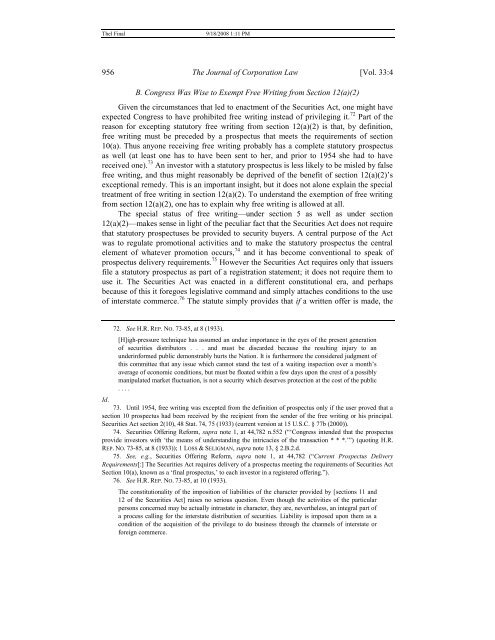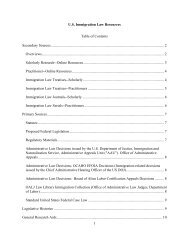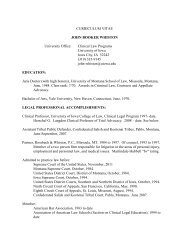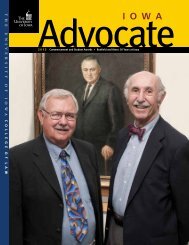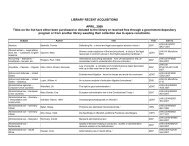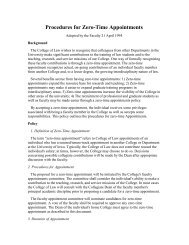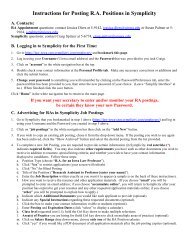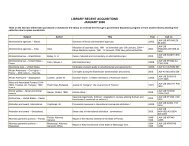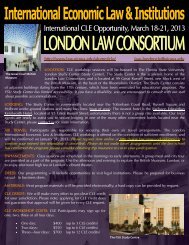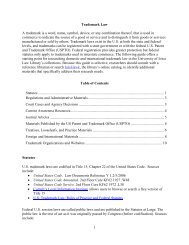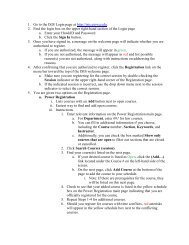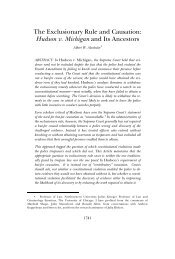Thel Final9/18/2008 1:11 PM956 The Journal of Corporation Law [Vol. 33:4B. Congress Was Wise to Exempt <strong>Free</strong> <strong>Writing</strong> from Section 12(a)(2)Given the circumstances that led to enactment of the Securities Act, one might haveexpected Congress to have prohibited free writing instead of privileging it. 72 Part of thereason for excepting statutory free writing from section 12(a)(2) is that, by definition,free writing must be preceded by a prospectus that meets the requirements of section10(a). Thus anyone receiving free writing probably has a complete statutory prospectusas well (at least one has to have been sent to her, and prior to 1954 she had to havereceived one). 73 An investor with a statutory prospectus is less likely to be misled by falsefree writing, and thus might reasonably be deprived of the benefit of section 12(a)(2)‟sexceptional remedy. This is an important insight, but it does not alone explain the specialtreatment of free writing in section 12(a)(2). To understand the exemption of free writingfrom section 12(a)(2), one has to explain why free writing is allowed at all.The special status of free writing—under section 5 as well as under section12(a)(2)—makes sense in light of the peculiar fact that the Securities Act does not requirethat statutory prospectuses be provided to security buyers. A central purpose of the Actwas to regulate promotional activities and to make the statutory prospectus the centralelement of whatever promotion occurs, 74 and it has become conventional to speak ofprospectus delivery requirements. 75 However the Securities Act requires only that issuersfile a statutory prospectus as part of a registration statement; it does not require them touse it. The Securities Act was enacted in a different constitutional era, and perhapsbecause of this it foregoes legislative command and simply attaches conditions to the useof interstate commerce. 76 The statute simply provides that if a written offer is made, the72. See H.R. REP. NO. 73-85, at 8 (1933).[H]igh-pressure technique has assumed an undue importance in the eyes of the present generationof securities distributors . . . and must be discarded because the resulting injury to anunderinformed public demonstrably hurts the Nation. It is furthermore the considered judgment ofthis committee that any issue which cannot stand the test of a waiting inspection over a month‟saverage of economic conditions, but must be floated within a few days upon the crest of a possiblymanipulated market fluctuation, is not a security which deserves protection at the cost of the public. . . .Id.73. Until 1954, free writing was excepted from the definition of prospectus only if the user proved that asection 10 prospectus had been received by the recipient from the sender of the free writing or his principal.Securities Act section 2(10), 48 Stat. 74, 75 (1933) (current version at 15 U.S.C. § 77b (2000)).74. Securities Offering Reform, supra note 1, at 44,782 n.552 (“„Congress intended that the prospectusprovide investors with „the means of understanding the intricacies of the transaction * * *.‟”) (quoting H.R.REP. NO. 73-85, at 8 (1933)); 1 LOSS & SELIGMAN, supra note 13, § 2.B.2.d.75. See, e.g., Securities Offering Reform, supra note 1, at 44,782 (“Current Prospectus DeliveryRequirements[:] The Securities Act requires delivery of a prospectus meeting the requirements of Securities ActSection 10(a), known as a „final prospectus,‟ to each investor in a registered offering.”).76. See H.R. REP. NO. 73-85, at 10 (1933).The constitutionality of the imposition of liabilities of the character provided by [sections 11 and12 of the Securities Act] raises no serious question. Even though the activities of the particularpersons concerned may be actually intrastate in character, they are, nevertheless, an integral part ofa process calling for the interstate distribution of securities. Liability is imposed upon them as acondition of the acquisition of the privilege to do business through the channels of interstate orforeign commerce.
Thel Final9/18/2008 1:11 PM2008] <strong>Free</strong> <strong>Writing</strong> 957first written offer must be the statutory prospectus. 77 The great irony of the Securities Actis that registered securities may be sold without ever delivering a prospectus. 78The device of free writing fills this lacuna. By permitting distribution participants touse free writing if, but only if, they send a statutory prospectus, the Securities Act createsa powerful incentive for them to send potential investors section 10(a) prospectusesvoluntarily and before investment decisions are made, since once they do they can sendtheir prospects anything else they want. The effectiveness of this incentive dependscritically on statutory free writing being exempt from section 12(a)(2). If it were not, theprospect of distributing free writing would not likely induce anyone to distribute astatutory prospectus.The exception of free writing from section 12(a)(2) appears, then, not to be adrafting bug, but a critical part of a mechanism for getting statutory prospectusesdistributed. <strong>Free</strong> writing is not carved out of the definition of prospectus simply so that itmay be distributed without violating section 5(b)—Congress had no reason to permit freewriting except to encourage the distribution of section 10 prospectuses. The exclusion offree writing from the definition of prospectus allows free writing to be used without fearof section 12(a)(2) liability, thus assuring that the right to distribute free writing is anattractive incentive to distribute section 10(a) prospectuses. The legislative payoff forexcluding free writing from the definition of prospectus is the exception of free writingfrom section 12(a)(2). The other (and better known) consequence of the definitionalexclusion—the exception of free writing from section 5(b)—is not so much an end initself as merely a necessary mechanical step to get the incentive scheme to work. 79Id.77. The SEC has long used its administrative power to push issuers and dealers to distribute statutoryprospectuses. See Rule 460, 17 C.F.R. § 230.460 (2006) (making distribution of preliminary prospectuses tounderwriters and participating dealers a condition of acceleration of the effectiveness of registration statement);Rule 15(c)2-8, 17 C.F.R. § 240.15c2-8 (2007) (requiring dealers to distribute preliminary prospectuses beforeconfirming sales). The Commission‟s 2005 reforms, however, suggest that it is no longer so concerned. SeeRules 172, 174(d), 17 C.F.R. §§ 230.172, 230.174(d) (2007) (treating access to the prospectus as delivery).78. See 1 LOSS & SELIGMAN, supra note 13, § 2.B.3, at 423-24 (“The securities industry can hardly beblamed for taking full advantage of this statutory scheme. But this is hardly the kind of informed investing thatwas contemplated when the Securities Act was passed. A prospectus that comes with the security does not tellthe investor whether or not he or she should buy; it tells the investor whether he has acquired a security or alawsuit.”); Richard E. Pringle, Summary Prospectus Proposal of Midwest Securities CommissionersAssociation, 23 BUS. LAW. 567, 568 (1968) (“The purchaser . . . does not usually receive the prospectus untilafter he is committed to purchase the securities.”). The Securities Act effectively required a section 10(a)prospectus to be delivered after a sale. A prospectus meeting the requirements of section 10(a) must be providedif and when a security is delivered after the sale. Securities Act § 5(b)(2), 15 U.S.C. § 77e(b)(2) (2000). Aconfirmation of sale is itself a prospectus, Securities Act § 2(a)(10), 15 U.S.C. § 77b(a)(10) (2000), and whenthe Securities Act was enacted securities transactions were generally subject to the statute of frauds. The statutewas typically satisfied by sending a written confirmation, and in order to do so in compliance with section5(b)(1), confirmations were qualified as free writing by delivering them with or after a section 10(a) prospectus.The 2005 reforms adopted the access equals delivery model for both these purposes as well, however. In mostcases, if a section 10(a) prospectus has been filed with the SEC it need not be delivered to a buyer. Rules 172,174(d), 17 C.F.R. §§ 230.172, 230.174(d) (2007).79. A similar rationale explains other seemingly odd aspects of the statutory definition of prospectus aswell. Tombstones and identifying statements are permitted and exempt from section 12(a)(2) in order to allowsellers to notify the public of the fact of the offering but not to inform them about the issuer of the offeredsecurities except by statutory prospectus. See supra text accompanying note 21 (discussing tombstones).


